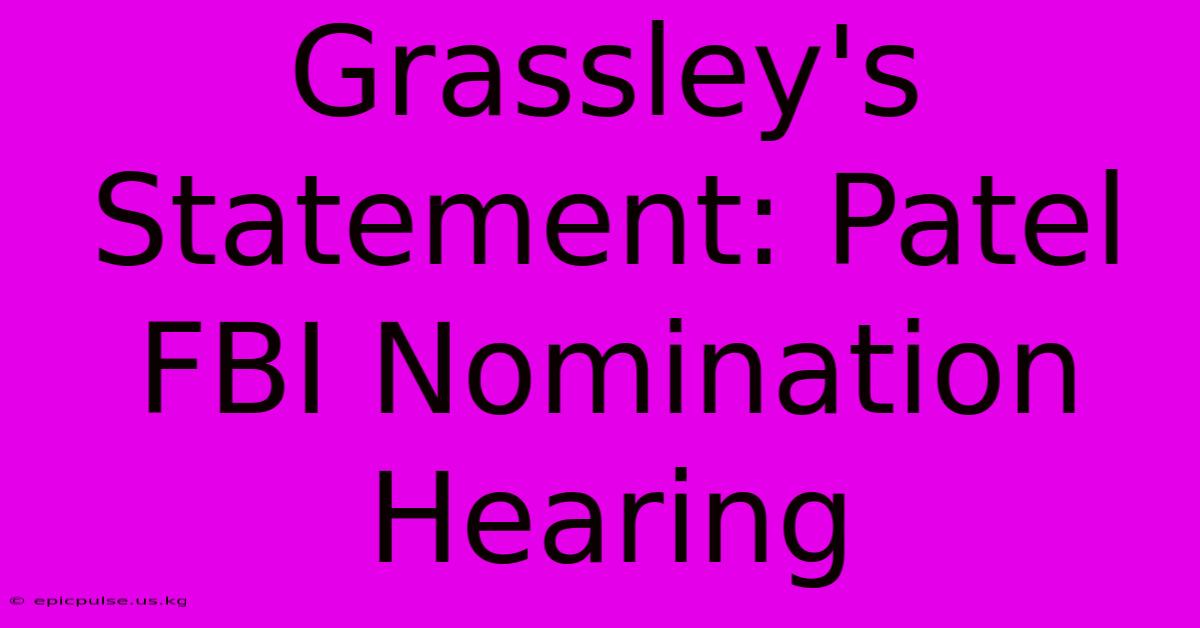Grassley's Statement: Patel FBI Nomination Hearing

Discover more detailed and exciting information on our website. Click the link below to start your adventure: Visit Best Website epicpulse.us.kg. Don't miss out!
Table of Contents
Grassley's Statement: A Deep Dive into the Patel FBI Nomination Hearing
On [Insert Date of Hearing], Senator Chuck Grassley, Ranking Member of the Senate Judiciary Committee, delivered a significant statement during the confirmation hearing for FBI Director nominee Christopher Wray. This statement, focusing heavily on concerns surrounding the Bureau's handling of certain investigations and its overall transparency, sparked considerable debate and continues to be a significant point of discussion in the ongoing conversation surrounding FBI accountability. This article will delve into the key aspects of Senator Grassley's statement, analyzing its implications and examining the broader context of the FBI nomination hearing.
Key Concerns Raised by Senator Grassley
Senator Grassley's statement wasn't a mere formality; it was a pointed critique of the FBI's practices, raising serious concerns about several key areas:
1. The Handling of the Hunter Biden Investigation:
A significant portion of Grassley's statement centered on the investigation into Hunter Biden, President Biden's son. Grassley expressed deep concerns about the apparent slow pace and perceived lack of thoroughness in the investigation, suggesting potential political influence at play. He highlighted specific instances and timelines, questioning the investigative techniques employed and the overall transparency of the process. The Senator emphasized the importance of impartiality and the need for the FBI to operate free from political pressure. He urged Wray, if confirmed, to ensure a full and fair investigation, regardless of political affiliations. This concern resonates with a wider public discourse on the politicization of law enforcement.
2. Concerns about the FBI's Use of Informants and Surveillance Techniques:
Grassley also voiced concerns about the FBI's use of informants and surveillance techniques, particularly regarding their potential for abuse and the lack of sufficient oversight. He emphasized the necessity of strict adherence to legal guidelines and regulations to prevent violations of individual rights and to maintain public trust. This aspect highlighted a broader national debate surrounding government surveillance and its impact on civil liberties. The statement implicitly called for greater transparency and accountability within the FBI's internal review processes.
3. Transparency and Accountability within the FBI:
Underlying all of Grassley's concerns was a persistent theme: the need for increased transparency and accountability within the FBI. He argued that the public's trust in the Bureau is eroded when investigations are perceived as biased or when critical information is withheld. He called for reforms to improve internal oversight, enhance communication with Congress, and ensure that the FBI adheres to the highest ethical standards. This echoes a growing public demand for greater government transparency across various sectors.
The Broader Context: FBI Reform and Public Trust
Senator Grassley's statement should be understood within the broader context of ongoing debates surrounding FBI reform and the need to restore public trust in law enforcement institutions. Recent events, including controversies surrounding various investigations, have raised questions about the Bureau's objectivity and its commitment to upholding the rule of law. Grassley's statement serves as a significant contribution to this ongoing conversation, highlighting the urgent need for meaningful changes within the FBI.
The statement also reflects a long-standing tension between Congress and law enforcement agencies regarding oversight and accountability. Congress has a responsibility to ensure that federal agencies operate within the bounds of the law and act in the best interests of the public. Grassley's critical remarks represent an attempt to fulfill this responsibility by holding the FBI accountable for its actions and demanding greater transparency.
Implications of Grassley's Statement
The implications of Senator Grassley's statement are far-reaching. It puts significant pressure on the FBI nominee, Christopher Wray, to address these concerns directly and demonstrate a commitment to reform. Wray's response during the hearing and his subsequent actions as FBI Director will be crucial in determining the Bureau's ability to regain public trust.
Furthermore, the statement could influence the direction of future FBI oversight and reform efforts. It could lead to further investigations, legislative changes, and increased scrutiny of the Bureau's operations. The concerns raised by Grassley are likely to remain a prominent topic in future Congressional hearings and policy debates.
Conclusion: A Call for Accountability and Reform
Senator Grassley's statement during the Patel FBI nomination hearing was not simply a critique; it was a call for accountability and reform within the FBI. By highlighting concerns about specific investigations, the use of surveillance techniques, and the overall transparency of the Bureau, Senator Grassley has contributed significantly to the ongoing national conversation about the role of law enforcement in a democratic society. The long-term impact of this statement will depend on how the FBI and Congress respond to these concerns. The need for greater transparency, accountability, and a renewed commitment to impartiality within the FBI is undeniable, and Grassley's statement serves as a powerful reminder of this crucial need. The future of public trust in the FBI hinges on its ability to address these critical issues effectively. The ongoing debate surrounding these issues underscores the importance of ongoing vigilance and the necessity of robust oversight mechanisms to ensure the FBI remains a trusted and impartial institution.

Thank you for visiting our website wich cover about Grassley's Statement: Patel FBI Nomination Hearing. We hope the information provided has been useful to you. Feel free to contact us if you have any questions or need further assistance. See you next time and dont miss to bookmark.
Also read the following articles
| Article Title | Date |
|---|---|
| Trump Blames Dei Democrats For Dc | Feb 01, 2025 |
| Ravens Tucker Rejects Allegations | Feb 01, 2025 |
| Live Updates Fcsb Vs Manchester United Europa | Feb 01, 2025 |
| Live Score Fcsb Vs Manchester United Europa | Feb 01, 2025 |
| Tucker Accused Of Sexual Misconduct | Feb 01, 2025 |
